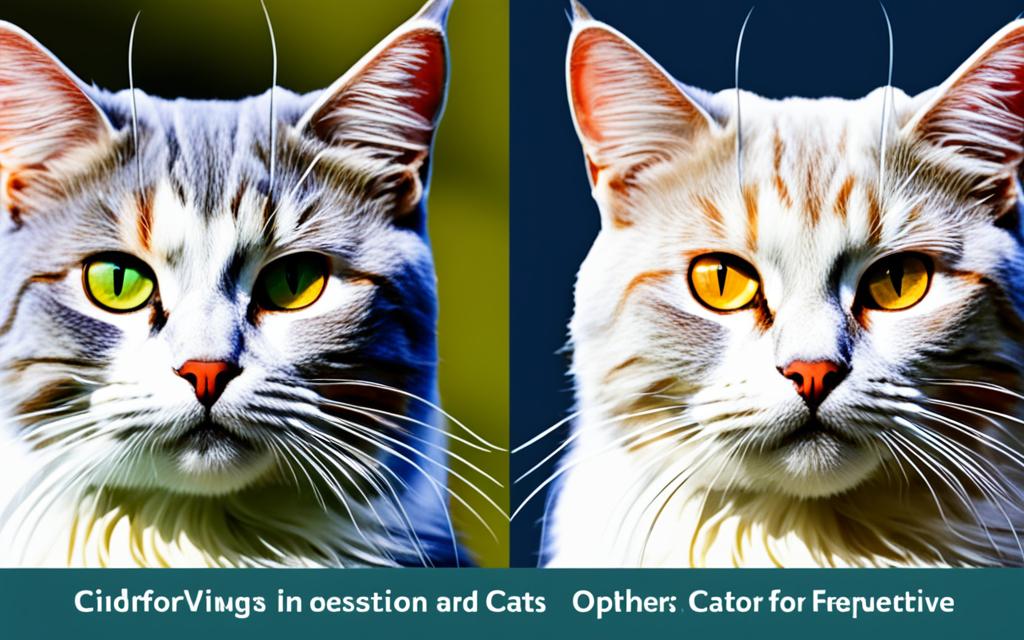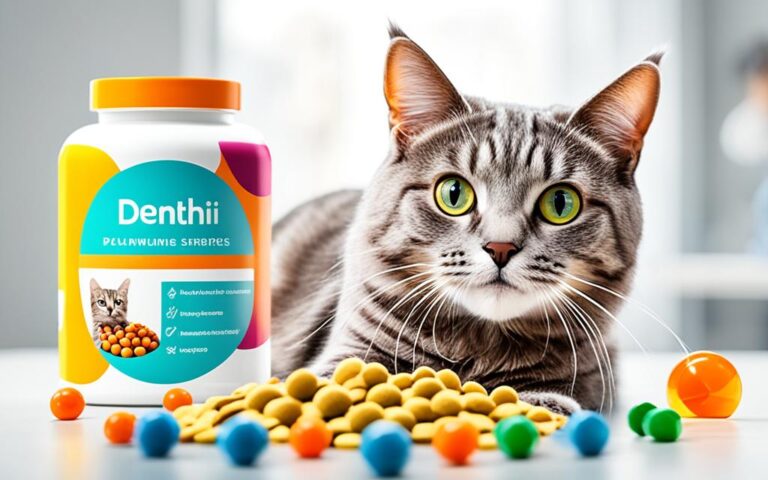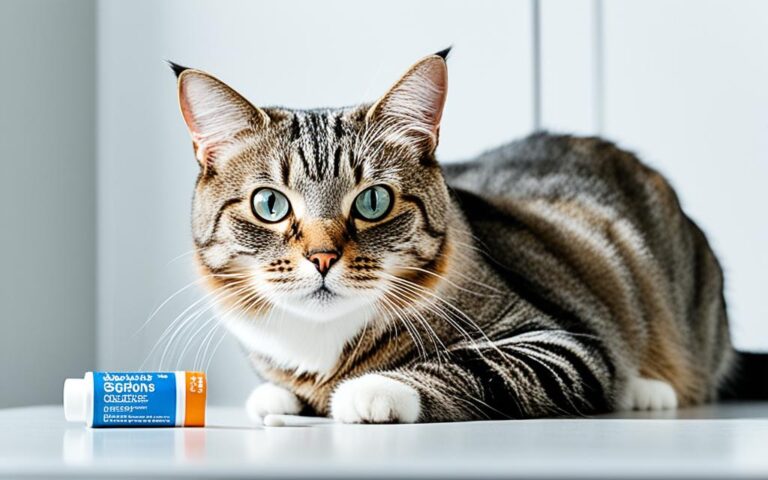Understanding Cidofovir for cats: Uses and Safety Info
Did you know about 80% of cats get affected by Feline Herpesvirus-1 (FHV-1)? This virus can lead to lifelong issues with eyes and breathing1. But now, there’s a powerful antiviral, Cidofovir, that offers hope. It’s used in special eye drops for cats dealing with eye infections and conjunctivitis because of FHV-11.
Cidofovir works great, even though it’s not FDA approved for pets2. It’s used to treat the signs of the virus, like in the eyes, and can be mixed into certain medications if needed. Veterinarians might suggest using it when other drugs don’t do enough to help the cat2.
Key Takeaways
- Cidofovir is a powerful antiviral medication used to treat feline herpesvirus-1 (FHV-1) infections in cats.
- It is administered as an ophthalmic solution (eye drops) to manage corneal ulcers and conjunctivitis caused by FHV-1.
- Cidofovir is not officially FDA-approved for veterinary use, but veterinarians can legally prescribe it in certain circumstances.
- Compounded versions of Cidofovir may be recommended when other approved medications are insufficient.
- Ongoing research is exploring Cidofovir’s potential as a safe and effective treatment for FHV-1 in cats.
Table of Contents
What is Cidofovir for Cats?
Cidofovir as a Potent Antiviral Medication
Cidofovir is a special antiviral drug made into eye drops for cats. It’s used to treat a common virus called feline herpesvirus-1. This virus affects their eyes, causing an infection called conjunctivitis and keratitis. This drug is not directly approved for cats but can be used. It’s made into eye drops by a vet or a special pharmacy34.
This medication is used ‘off-label’ because it wasn’t made specifically for cats. But, it has shown good results in many cases. Your vet or a pharmacy can mix the right amount for your cat3.
Compounding Cidofovir for Veterinary Use
Cidofovir is not made by companies that normally make pet medications. Instead, it’s specially mixed by a pharmacy for animal use. Cats usually start getting better within a few days of using it. But, it might take up to a few weeks to see the best results54.
Note that this drug should not be used in dogs’ eyes. It can be harmful and cause eye problems4. In certain cases, when standard treatment doesn’t work, your vet might suggest trying a special mix of cidofovir. This can be especially helpful when other medications can’t manage your pet’s health well4.
The lesser 0.5% strength of the eye drop rarely leads to any side effects. But stronger mixtures can sometimes irritate the eyes. This can show as swollen eyelids or conjunctivitis5. It’s great that the milder version is safe for use5.
It’s unlikely for pets to have bad reactions inside their body from the eye drops5. But when giving more than one eye medicine, make sure to wait at least 5 minutes between each. This helps them work their best and prevents any problems5.
This drug fights viral eye infections, not bacterial ones. Using it with certain other eye drugs may lessen its antiviral effect. So, always tell your vet about any other eye medicines they are using5.
Depending on the strength and how it’s made, cidofovir needs different storage. Always follow the instructions on how to store it. If you’re not sure, ask your pharmacist5.
“It is important to monitor the cat for any adverse reactions or side effects while using cidofovir and inform the veterinarian promptly.”3
If a pet takes too much of this medicine or a person accidentally takes it, contact a vet or poison control right away. The numbers are 888.426.4435 or 800.222.1222. This is important safety information534.
How Cidofovir Works in Cats
Cidofovir’s Mechanism of Action Against Viruses
Cidofovir is an antiviral medication. It treats viral infections6. It stops a virus from making the proteins it needs to grow and survive6. This action is effective against many viruses. For example, it works well against the feline herpesvirus-1 (FHV-1), which causes eye infections in cats.
Research shows that cidofovir fights FHV-1 in cats effectively7. Cats treated with cidofovir had less severe symptoms and shed less virus6. A 0.5% cidofovir eyedrop also caused no harm6. But, stronger cidofovir solutions can irritate the eyes in some animals6.
Cidofovir stays in the body for a long time, so it’s given less often than other drugs for FHV-16. This makes it easier for cat owners to give their pets their medicine6. A study by Fontenelle J.P. et al highlights the use of cidofovir eye drops for treating FHV-1 in cats6.
While mostly safe, cidofovir might have side effects in humans at higher doses6. Using too much cidofovir in cats can cause eye problems like conjunctivitis6. So, it’s essential to use the right amount with care.
To sum up, cidofovir is a key tool for vets fighting FHV-1 infections678. By blocking virus protein creation, it fights this common issue in cats effectively8.
Administering Cidofovir for Cats
For your cat’s health and safety, it’s key to give cidofovir correctly. Always stick to the dosage and use instructions from your vet9.
Proper Dosage and Frequency
Eye drops are the common way to give cidofovir, and you should give them twice each day9. Make sure you give the exact amount your vet says. Also, don’t let the dropper touch your cat’s eye or anything else9.
Wait five minutes before giving cidofovir if your cat also needs other eye medicines. This helps the cidofovir work better and avoid issues with the other drugs9.
Techniques for Applying Eye Drops to Cats
If your cat’s eye drops are a challenge, your vet can help with tips. They might suggest wearing gloves to be safe9.
- Hold your cat’s head gently. Have it rest on your hand at the back.
- Pull the lower eyelid down a bit to make a small space.
- Put in the right number of drops without the dropper touching the eye.
- Let go of the eyelid so your cat can blink and spread the medicine.
- Finish up with praise and a treat to help your cat relax.
Working together with your vet using these steps can make the cidofovir treatment smooth. This helps keep your cat healthy and happy9.
“Giving cats eye drops needs patience and care. With good advice and practice from your vet, you can help your cat feel better.”
Potential Side Effects of Cidofovir for Cats
Cidofovir ophthalmic solution is safe for many cats, but watch out for side effects10. A big concern is acute renal failure. This can make your cat need dialysis or, sadly, even cause death10. About 88% of cats might have proteinuria and 59% nephrotoxicity from Cidofovir10.
Some cats might get eye problems or low eye pressure from Cidofovir, which was seen in 11% and 24% of cases10. Feeling sick and low serum bicarbonate levels have been noted in up to 23% and 16% of cats10. Issues like low white blood cells and red blood cells occurred in up to 43% and 24% of cats10.
Nausea and diarrhea are also quite common, affecting up to 69% and 26% of cats10. Additionally, fever and feeling weak happened in up to 58% and 43% of cases10. Infection hit 28% of cats taking Cidofovir10.
Hair loss and skin rashes can also occur in many cats, up to 27% and 30% of cases10. Tell your vet if you see any side effects, as quick action may be needed11.

Cidofovir can seriously affect the kidneys, sometimes leading to death soon after taking the medicine11. Neutropenia, a low count of a specific white blood cell, may also happen. So, it’s very important to keep an eye on your cat’s blood counts11.
Always talk to your vet about possible side effects before giving Cidofovir to your cat10. With proper care and fast action, the use of this antiviral drug can be both safe and helpful111012.
Cidofovir for cats: Precautions and Interactions
Cidofovir is a powerful antiviral drug used in cats. However, it’s important for pet owners and vets to be careful when using it. This drug isn’t for all cats. Avoid using Cidofovir on cats that may breed, are pregnant or nursing, and those with kidney issues or react badly to the drug13.
If your cat is on other medications or supplements, be extra cautious. Combining Cidofovir with drugs that can damage the kidneys is risky. Always ensure your vet knows about your cat’s medical history and current treatments before using Cidofovir13.
Safe Handling and Storage Guidelines
Learning how to handle and store Cidofovir is vital for your cat’s safety and well-being. Since the drug might be in your cat’s body waste, wear disposable gloves when in contact. Keep the medicine in its original bottle in the fridge to prevent moisture and light from damaging it13.
Adhering to these handling and storage tips is key. They ensure your cat gets the full benefits of Cidofovir without any unnecessary risks. Being careful with this medication is crucial for your cat’s health13.
Comparing Cidofovir to Other Antiviral Options
Veterinarians have many antiviral drugs for feline infections. Cidofovir is a broad-spectrum antiviral medicine, especially good for feline herpesvirus type-1 in cats14. But, how well does cidofovir work compared to other antivirals? Plus, what about the cost and potential side effects?
Efficacy and Cost Considerations
Famciclovir is used by mouth for feline herpesvirus type-1 in cats14. Cidofovir, applied on the skin, has been effective against a specific virus in rabbit eyes14. Various antivirals were tested against feline herpesvirus type-1, including cidofovir. It showed good results.
Research looked at cidofovir’s stability if kept for up to 6 months14. It’s easier to use twice a day than idoxuridine that needs five times daily, but cidofovir can be more costly15.
Side Effect Profiles
Using antivirals, even on the skin, needs care because they can be more toxic than antibacterial drugs15. A review studied cidofovir’s impact on herpesvirus in cats’ eyes14. It’s important to watch for any eye irritation from cidofovir.
While cidofovir might save money, doctors need to think about its benefits and risks for each cat. More studies are being done to compare cidofovir with other antivirals in cats.

Key Benefits of Using Cidofovir for Cats
Cidofovir is a strong antiviral. It’s great for treating eye infections in cats caused by FHV-116. It works well and doesn’t need a long treatment time, making it a top pick for vets17.
Why is cidofovir good for cats? It goes after the viral DNA. This stops the virus from spreading and making the infection worse18. It helps get rid of eye infection symptoms, like red eyes and eye sores, as a vet prescribes16.
The good news is cidofovir continues to work well over time. You’ll see the cat’s eye problems get better slowly17. It’s ideal for stubborn or repeated herpesvirus cases, needing treatment that keep going for a while.
Although using cidofovir for cats is off-label, it proves to be a valid choice for vets. It’s especially good when other treatments have failed18. With the right use and watching, cidofovir can lessen a cat’s discomfort from this widespread disease.
So, what are the advantages of cidofovir for cats? It does a great job against FHV-1 eye infections. Plus, it works on a wide range of viruses and doesn’t need long treatment times like some other options do161718.
Cidofovir Dosage Information for Cats
When giving your cat cidofovir, carefully follow your vet’s dosage instructions19. This medicine is usually given twice a day. It’s crucial to stick to this schedule for it to work well.
Understanding Missed Dose Guidelines
Missed a dose of cidofovir? Give it when you remember, unless it’s almost time for the next dose19. Then, it’s better to wait. Skipping the missed dose is safer than giving two doses too close together.
Not sure what to do about a missed dose? Talk to your vet right away19. They can help you decide the best next step. It’s important not to guess or give extra doses.
Store cidofovir as the label says19. Keep it in the fridge, away from light and not too cold. By doing this, the medication will stay effective for your cat.
If you think your cat took too much cidofovir, act fast19. Call your vet or an emergency clinic. Quick response is key to your cat’s health.
Managing cidofovir correctly helps your cat get better without harm19. Work closely with your vet for the best care. This is vital to your cat’s treatment success.
Conclusion
Cidofovir is a strong medicine against feline herpesvirus-1 (FHV-1) eye infections in cats20. Even though it’s not officially for cats, many vets use it off-label. This shows its importance for treating this virus21.
Cidofovir, when used correctly, has been effective in cats20. It helped reduce viruses and improved the health of treated cats. They had fewer symptoms and recovered faster20. Also, it didn’t show any harmful effects on the cats’ liver or kidney20.
The veterinary world is keen on cidofovir’s potential. There are plans for more tests to check its safety and if it helps. There’s also hope in other treatments like Famcyclovir that seem helpful and safe as of now20. This knowledge helps pet owners and vets choose the best treatments for cats with these infections.
FAQ
What is Cidofovir?
How does Cidofovir work?
How is Cidofovir administered to cats?
What are the potential side effects of Cidofovir in cats?
Are there any precautions or interactions to be aware of with Cidofovir?
How does Cidofovir compare to other antiviral options for cats?
What are the key benefits of using Cidofovir for cats?
How should I handle missed doses of Cidofovir for my cat?
Source Links
- CUVS Proceedings Feline
- Feline Herpesvirus Type 1 – Eye Specialists for Animals – Denver, Colorado Springs
- Cidofovir Ophthalmic | VCA Animal Hospitals
- Cidofovir for Cats
- Uses, Dosage & Side Effects
- Cidofovir Ophthalmic for Veterinary Use
- No title found
- Feline study: new model helps identify drugs to treat cat eye infections
- The Latest Information on Antiviral Therapy for Feline Herpesvirus – WSAVA2011
- Cidofovir Side Effects: Common, Severe, Long Term
- Vistide (Cidofovir): Side Effects, Uses, Dosage, Interactions, Warnings
- Cidofovir in Artificial Tears Ophthalmic Solution 5mL Bottle | Northwest Compounders
- Cidofovir Intravenous: Uses, Side Effects, Interactions, Pictures, Warnings & Dosing – WebMD
- A review of antiviral drugs and other compounds with activity against feline herpesvirus-1
- Herpesvirus and the feline eye
- Feline Herpesvirus: Therapeutic Review
- Cidofovir cats
- Cidofovir Ophthalmic | VCA Animal Hospitals
- Cidofovir shows promise in treatment of FHV-1 conjunctivitis
- International Journal of Pharmaceutical Compounding







